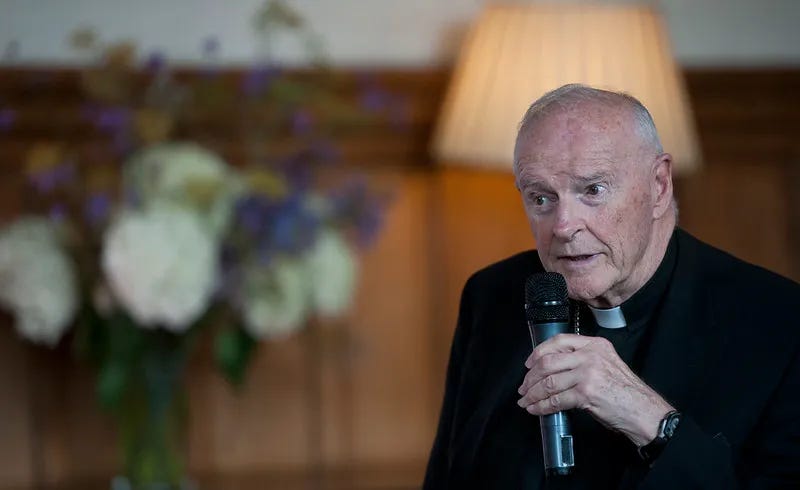Theodore McCarrick dead at 94
McCarrick was the first U.S. Catholic bishop to face criminal charges over sexual assault allegations.

The disgraced former cardinal Theodore McCarrick died April 3 at the age of 94.
Before allegations of sexual abuse led to his 2018 disgrace and eventual laicization, McCarrick was one of the most prominent and influential churchmen of his generation, enjoying celebrity status and international recognition in an ecclesiastical career spread over seven decades.
McCarrick, born in New York City in 1930, died in Missouri, where he had been living for several years in a facility for clerical sex offenders run by a religious order.
In August 2023, a Massachusetts judge dismissed assault charges against McCarrick in that state, also because the former cardinal was found to be impeded by dementia from participating in his own defense.
McCarrick was ordained for the Archdiocese of New York in 1958, and consecrated a bishop in 1977, serving first as auxiliary in his home archdiocese before moving to lead the Diocese of Metuchen, New Jersey in 1981. He was later made Archbishop of Newark in 1986, leading the archdiocese until 2000, when he moved to Washington, D.C.
He was created a cardinal by Pope St. John Paul II in 2001.
McCarrick retired from episcopal ministry in 2006.
In 2018, McCarrick was publicly accused of serially harassing and abusing priests and young seminarians while he led the archdioceses of Newark and Washington, and a 2020 Vatican-issued report confirmed that the former cardinal had long been suspected of illicit sexual and coercive activity.
Soon after the allegations emerged, McCarrick was told to resign from the College of Cardinals by Pope Francis, which he did. The then-archbishop then spent several months living in a Kansas Franciscan friary, before leaving in 2020 for a residence in Missouri, which was not initially disclosed publicly.
McCarrick was known to have given large cash gifts during his ecclesiastical career, and suspected of using unaudited diocesan slush funds to do so. It is widely believed those gifts might have paved the way to his promotions within the Church, or compelled bishops, some of whom might still be in ministry, to ignore or cover-up McCarrick’s misdeeds.
The Vatican report did not address McCarrick’s finances, but it is believed that in both the Newark and Metuchen dioceses, internal investigations have turned up financial records that detail McCarrick’s gift-giving, and paint a picture of his social networks of influence. The Archbishop of Newark has said he is impeded by a state investigation from releasing the results of those investigations, while the Washington archdiocese has frequently declined questions on the matter.
While he generally shied away from media attention after his 2018 allegations, McCarrick released a statement on the day the accusations were announced, in which he insisted on his innocence.
“While shocked by the report, and while maintaining my innocence, I considered it essential that the charges be reported to the police, thoroughly investigated by an independent agency, and given to the Review Board of the Archdiocese of New York. I fully cooperated in the process,” McCarrick said.
In 2019, McCarrick told reporter Ruth Graham that “I’m not as bad as they paint me.”
“I do not believe that I did the things that they accused me of,” he added.
Regarding the specific allegation that he had groped a minor during the sacrament of confession, McCarrick told Graham: “The thing about the confession, it’s a horrible thing … I was a priest for 60 years, and I would never have done anything like that. … That was horrible, to take the holy sacrament and to make it a sinful thing.”
Reporting in 2018 — later acknowledged by the Vatican’s own report on McCarrick — established that in retirement McCarrick lived in a seminary in the Washington archdiocese, which he was in 2008 ordered to vacateby papal nuncio Archbishop Pietro Sambi, on behalf of Pope Benedict XVI, because of allegations of his prior misconduct.
In addition to his 2019 canonical administrative penal process at the Vatican, McCarrick faced numerous criminal and civil actions over accusations made against him, which alleged sexual abuse against both young men and minors. He was the first U.S. Catholic bishop to face criminal charges over sexual assault allegations.
In December 2024, a Wisconsin judge ruled that sexual assault case against McCarrick would remain suspended for the remainder of the former cardinal’s life because McCarrick, suffering dementia, was not mentally capable of mounting a defense.
In August 2023, a Massachusetts judge also dismissed assault charges against McCarrick in that state, because the former cardinal was found to be impeded by dementia from participating in his own defense.
The 2018 allegations against McCarrick initiated a global outcry among Catholics for greater accountability for bishops accused of abuse or cover-ups, and heightened awareness in the Church of the prospect of coercive abuse of adults.
That led eventually to a global summit on clerical sexual abuse, a set of policy reforms inaugurated in 2019 by Pope Francis, which aimed at more objective evaluations against bishops, and greater transparency. Those reforms have been met with a mixed assessment by practicing Catholics and abuse advocates.















